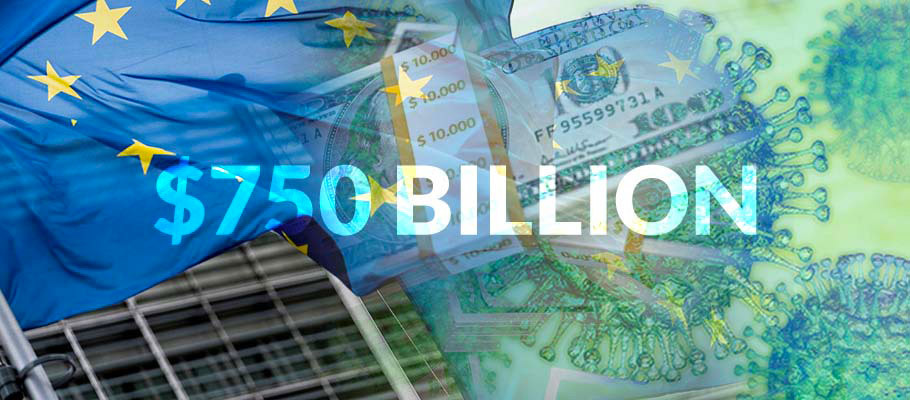
Published: April 13th, 2020
On Thursday, April 9, the European Union Finance Ministers agreed via video link to greenlight three new programs that will inject a total of $590 billion into the block’s economy. The coronavirus stimulus package comes but without a unanimous commitment to issue joint liability instruments.
The Finance Ministers of the European Union on Thursday, April 9 agreed to summon more than €500 billion (Approx. $590 billion) worth of funds and measures to cushion their economies against the ravaging effects of the novel coronavirus pandemic. The meeting conducted over a video link, however, left the worst-hit members of the block holding the shorter end of the stick.
Spain and Italy, the block’s worst-hit by the health crisis, hoped that their partners would agree to issue a joint debt. Faced with an unprecedented economic crisis borne of a fast-spreading virus that has killed more than 50,000 people in the EU and infected another 500,000, Spain and its southern European counterpart hoped that their wealthy northern European counterparts would come to their aid.
While the Netherlands and Germany seemed a lot more generous than they have been before, the final details of the package indicate that they have retained control of how the funds will be used.
The programs agreed on by the finance ministers to be forwarded to their respective leaders for approval are €100 billion (Approx. $110 billion) in loan plans that will go towards unemployment benefits and €200 (Approx. $220 billion) billion to aid small businesses. Another €240 billion (Approx. $262 billion) will be made available for Euro-area as loans for the Eurozone bailout fund.
The ministers, however, did not issue join bonds. This should not come as a surprise since the Eurozone has not issued any joint bonds in the short history of the block.
In what seemed like a victory for the Netherlands, which together with Germany had lobbied staunchly for the ministers’ grip on the bailout package, the funds shall be expended only on issues related to health.
The EU has always been against joint debt. The scope and size of the current health crisis, however, pushed some analysts to believe that the block may set precedence by backing the idea this time.
Doing so would have meant the EU is willing to match towards becoming the United States of Europe. A joint debt was fundamental in the creation of the U.S. and the EU doing the same would have been indicative of the block’s intention to alter its governance structures to lean closer to federalism.
As the ministers held the virtual meeting, they were all aware of the straining toll that the pandemic has taken on the block’s economy. Failure to reach an agreement, as such, would have eroded confidence in the block and its financial markets.
Mujtaba Rahman, the managing director of Eurasia Group in charge of Europe says that the priority was to have the ministers sign off on the €540 deal. He thinks that despite the round of applause going around and everyone feeling good about themselves, the ministers skipped some very substantive gaps that will only become apparent later on.
At stake, Mujtaba thinks, is the recovery of the Eurozone, which is the richest block of nations in the world. Besides, the zone’s currency, which is used by the 19 member states, is among the few important currencies globally.
Analysts think that the block’s failure to rescue its most vulnerable and affected members will hurt later on. Dennis Shen, a top executive at Europe’s Scope Ratings says that the failure to sign off on a joint debt will hurt not just the economies of the EU block but also the countries’ societal attitudes and regional politics as well. He says that the move by the ministers may make the block lose clout on the global stage.
While €500 billion and the various stimulus packages arranged at the national level totaling approximately €690 billion (Approx. $750 billion) are a huge figure, it not easy to tell if it will be adequate in helping the Eurozone economies to withstand the harsh effects of the health crisis. Whether the stimulus stretches to help the countries achieve some form of growth as economic activity resumes is another issue altogether.
Germany, the Netherlands, and their allies may have prevented a joint debt, also called corona bonds, but eventually, the weight of the rescue package rests with them. These countries will have to subsidize the receipts of the worst-hit countries.
Besides, the European economies are integrated and this makes the rescue package beneficial to all the countries in the block. The refusal by the richer countries of northern Europe to come to the aid of their relatively poor southern European counterparts, however, put the solidarity of the block into contention.
The Italian Prime Minister Giuseppe Conte feels that the deal made on Thursday is a tough sell. Conte passionately appealed for the block to consider a joint debt issuance. Besides, he has been at the forefront demanding that the members of the EU provide Italy with a Eurozone bailout fund that will help his country recover from the effects of the pandemic. Unfortunately, his counterparts gave in to none of his requests.
The wealthier countries hold that the bonds will raise the cost of borrowing. The leaders of these countries worry that approving such debt would foster anti-EU populists’ agenda within their borders. Besides, every nation in the block is responsible for its finances, they argue.
The EU finance ministers held a meeting on Thursday where they agreed to make available a stimulus package worth €540 billion to resuscitate the economies of the block’s countries. However, the ministers failed to agree on a joint debt, leaving Italy and Spain, the worst-hit countries, with a deal that is inadequate to address their current problems. Whether the amount availed will be enough for the entire block also remains to be seen.